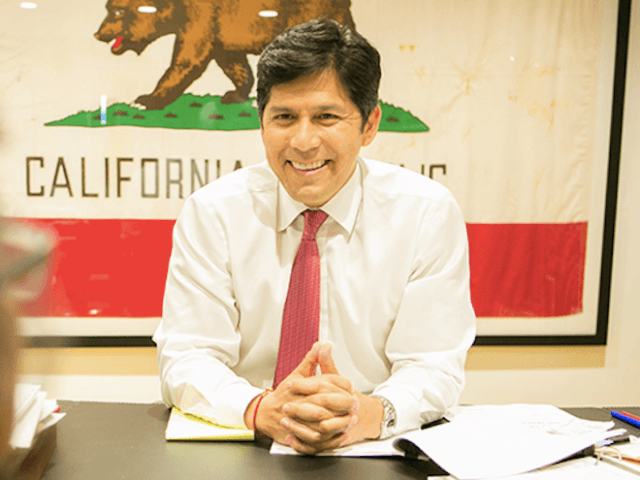State Senate President Kevin De León, who recently made headlines by announcing that he has relatives in California who are here in violation of U.S. immigration laws, is pushing legislation to make California a “Sanctuary State” – i.e. prohibiting state law enforcement agencies in California from cooperating with federal immigration authorities.
De León is pressing the proposal despite opposition from law enforcement leaders and President Donald Trump, and despite strong negative opinions from California residents.
Senator De León’s bill, SB 54, is a laundry list of any conceivable way that any state and local law enforcement agencies, including school police and security departments, could potentially directly or indirectly play a role in the enforcement of United States immigration laws – and sets forth that engaging in any of these actions is prohibited.
Since federal law requires state and local law enforcement to turn over all information on the immigration status of detainees, the proposed state law also prevents the collection of this information, presumably under the theory that information that has not been obtained can also not be conveyed to federal law enforcement officials.
De León’s legislation is extreme, both in its policy objectives, and in its attempt to impose a standard on every local county, city and local government law enforcement agency, regardless of the wishes of the local elected officials and the people they represent in their community.
It is already the case that so-called “sanctuary city” policies adopted by many local governments around California have already led to a public safety crisis, as these laws are drawn to keep law enforcement professionals from using every tool legally available to them to keep our communities safe.
Once of the highest-profile examples took place in San Francisco in 2015, where 32-year-old Kate Steinle was fatally shot dead on a city pier by Juan Francisco Lopez-Sanchez (who apparently went by several names). Lopez-Sanchez, originally from Mexico, had been convicted of several felonies and was deported five different times back to Mexico before murdering Steinle.
Prior to Steinle’s murder, the Sheriff’s Department in San Francisco had approved a policy to cease communicating about illegal immigrants with U.S. immigration authorities. After that policy was approved, U.S. Immigrations and Customs Enforcement (ICE), after learning that Lopez-Sanchez being held on a bench warrant coming out of a decades-old drug trafficking case, asked the Sheriff’s Department to notify them if he was released. ICE said that the Sheriff’s Department did not comply with its request.
Lopez-Sanchez, in a media interview, rather brazenly said that he chose to move to San Francisco because of its sanctuary city policy.
There is every reason to believe that had he been turned over to ICE, Kate Steinle would be alive today.
Just last month, 42-year-old Sandra Duran was killed when Estuardo Alvarado, who was fleeing from the scene of a traffic accident in his car when he slammed into Duran’s car in Los Angeles, another so-called “sanctuary city.” Alvarado was charged with murder, vehicular manslaughter and driving while intoxicated.
Alvarado, a Mexican citizen, has never held legal status in the United States. He had been deported back to Mexico five times since 1998, most recently in 2011. He had also reportedly previously pleaded no contest to a different DUI charge, in addition to charges of including resisting arrest and impeding traffic, and multiple citations for drug possession.
While De León’s legislation seems to be popular with many of his liberal colleagues in the California legislature, based on the robust list of co-sponsors, an independent statewide survey of California residents conducted last August by U.C. Berkeley’s Institute for Government Studies shows that “sanctuary city” policies are overwhelmingly opposed by the public.
IGS surveyed 1,098 Californians and found that 74% said that local authorities should not be able to ignore a federal request to hold a detained person who is in the country illegally. Opposition to the policies spanned the political spectrum, with 73 percent of Democrats, 82 percent of Republicans and 71 percent of independent voters disapproving of local governments not cooperating with the federal authorities. The survey also showed that two out of three Latinos surveyed oppose “sanctuary city” policies.
De León’ss proposal caught the eye of President Donald Trump as well, who spoke to it in a pre-Super Bowl interview on Fox News, where he told host Bill O’Reilly, “As you know, I’m very much opposed to sanctuary cities. They breed crime. There’s a lot of problems. If we have to, we’ll defund. We give tremendous amounts of money to California. California in many ways is out of control you know.”
Trump has issued an Executive Order specifically cutting off federal funds to cities that adopt sanctuary policies, something he promised to do during his campaign.
On Monday, some California legislators were joined by a number of elected county sheriffs for a press conference at the State Capitol in Sacramento. There, State Senator Joel Anderson (R-Alpine), a leading critic of De León’s legislation, said that the proposal, “…would protect rapists, murderers, armed robbers, and serial drunk drivers.”
As this issue heats up, it reinforces the notion that Democrat legislators in control of California state government are hell-bent on opposing President Trump on a myriad of significant issues – but especially on cracking down on illegal immigration.
That said, this play by De León looks like extreme overreach that could not only pit public opinion nationally against California’s liberal political class, but also put California Democrats crosswise with the voters who elevated them into office.
Jon Fleischman is the Politics Editor for Breitbart California. His columns appear regularly on this page. He has been chronicling the California political scene for nearly three decades. He can be found on Twitter here.

COMMENTS
Please let us know if you're having issues with commenting.